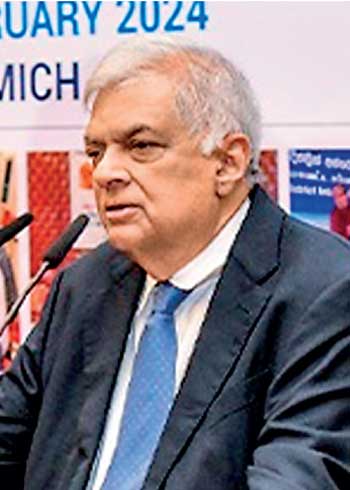Tuesday Feb 17, 2026
Tuesday Feb 17, 2026
Saturday, 2 March 2024 00:00 - - {{hitsCtrl.values.hits}}
 By The National
By The National
Peace Council
The need for political consensus with regard to the solution to the ethnic conflict and achievement of national reconciliation was notable at the national symposium organised by the National Peace Council on the theme of “Religions to Reconcile: Strengthening Inclusive Reconciliation” with the participation of over 300 religious clergy of different religions and grassroots leaders from inter-religious committees from 17 districts including the north and east. Political party leaders representing the Government and opposition who participated in the symposium emphasised on the necessary steps to be taken, new mechanisms to be established and the need for an enabling environment.
President Ranil Wickremesinghe sketched out his reconciliation plan on the occasion and said that the country was in the last stages of the reconciliation process with the identification of the problem of prisoners, disappeared and missing persons and their resolution through a truth and reconciliation mechanism to be set up; the passage of a land commission law which would be implemented to deal with land issues; and provincial councils that could be strengthened through the concurrent list. In that regard he said that some Buddhist monks and Tamil leaders [from the Diaspora] had presented the Himalaya Declaration, which outlines points of convergence on a mutually acceptable solution which would be taken forward.
Opposition members expressed sentiments that focused on the need for an enabling environment including the adherence to the democratic process, holding of elections and independence of institutions. The National Peace Council observes that in the context of civil society’s work to create this enabling environment for peace and reconciliation, the proposed new NGO registration and supervision law would be a major setback. NPC is heartened by the message of Opposition Leader Sajith Premadasa to the symposium that “We believe it is non-negotiable for any government to create a conducive environment for organisations dedicated to promote peace and reconciliation to carry forward their good work with minimum legal constraints.”
We believe that as much as there is a need for a consensus on resolving the ethnic conflict and bringing about national reconciliation, there needs to be a consensus on protecting democratic and human rights and civil society freedoms that create the enabling environment for State mechanisms to have credibility and to work effectively, in providing software to the system. Such a consensus alone can bring about the positive peace that the late Professor Johan Galtung posited, where all people feel that the State protects and nurtures them, in contrast to negative peace, which is merely the absence of war.